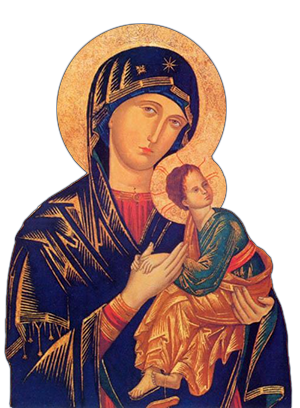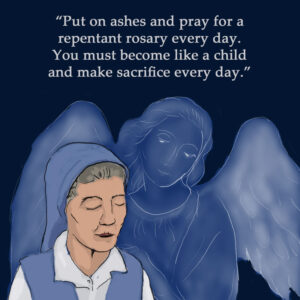Father Linus Clovis: the first four Apostles
When we have heard the Gospel proclaimed, we ought constantly to ponder the meaning of what we’ve heard. In this way, we will get to know Our Lord much better. We ought then to familiarize ourselves with him and his work; what he has come to do, in particular, what he’s come to do for us. And if we are to get to know a person, what do we want to know about them? Well, the first thing we do is to find out their background; where they came from, and what they were doing, and so on, and we can certainly do that with the Gospels. We can get to know a lot of what Our Lord did from the Gospels, and in this way, we get to know him. And then we listen to what he says, what he teaches, and we have a deeper understanding. But even more profoundly, is we observe what he does, and it is in this that we begin to enter into the mysteries. There’s a saying that deeds speak louder than words.
When we listen to saint Mark’s Gospel, it’s very brief, very much to the point, scant of details, as compared to the other Gospels. And so we have to blend the four Gospels together, that is, Matthew, Mark, Luke and John. The first three Gospels, Matthew, Mark, and Luke are very similar, they focus essentially on the humanity of Our Lord. The Gospel of John is different because it focuses more on the divinity of Our Lord. And then within the first three Gospels, there are variations.
Saint Matthew, for instance will focus a lot on the Jewish heritage of Our Lord. He will refer to the prophets and the prophecies showing Our Lord fulfilled them.
In the case of Luke, who was a physician, a medical doctor, we find there’s a lot of emphasis on the miracles, especially those of healing.
John, in general, focuses on the the divine acts of Our Lord and that titanic struggle between light and darkness, good and evil, that continues even to today.
Mark is brief and to the point, and yet he’s the link between the first three Gospels.
So, putting them together, what do we get? And it’s important for them to be put together. If we treat them separately, it will appear as if we have contradictions and, of course, there can be no contradictions in the Sacred Scriptures. God does not contradict himself.
So then, where do we begin? We begin with John’s Gospel. We will then proceed to the the other three Gospels. And we do this because John’s Gospel focuses initially on the first year or so of Our Lord’s life, and the other three Gospels on the last years of his life.
In John’s Gospel, we were told of course about John the Baptist who is baptizing. And then the Scribes and Pharisees send a message to John: who are you? John testifies that he’s not the Christ, that he is, in fact, the voice of one crying in the wilderness. And then, soon after that, Our Lord comes and is baptized. What happens after baptism? We’re told immediately when we go to the first three Gospels, that Our Lord goes into the wilderness; he’s led by the Holy Spirit into the wilderness to be tempted by the devil.
So he spends the 40 days in the wilderness. After this, the temptation. After the temptation, he comes back to the Jordan. And so, we go back to John’s Gospel. And John says, this is a man about whom I spoke and, in particular, when Our Lord passes by again, he says, “behold the lamb of God.” And two of his disciples follow him. One of them is Andrew. Andrew would bring his brother Simon the next day to meet Our Lord, who said you are Cephas, and so on. And then there’s a silence again.
And then Our Lord goes to Jerusalem, and there’s a cleansing of the temple. And then there’s the first miracle at Cana. Our Lord continues his work in Jerusalem, and then he goes back to Galilee. He’s got disciples–he gathered them–but he’s not very prominent; his works aren’t very prominent.
And now we’re told, after John had been arrested–see John, in his Gospel, says in the case of the miracle of Cana that, John had not yet been arrested, but now, we have, after John had been arrested, Our Lord returned to Galilee, and there he proclaimed the good news from God. What is this good news? The time has come, he said and, the kingdom of God is close at hand. Repent and believe the good news. This is exactly what John the Baptist was saying, repent, believe the good news. there’s one coming after me whose sandals I’m not fit to undo. Our Lord picks up the the theme: repent and believe the good news. So, in this way, he forms a link. What John’s mission is precedes Our Lord’s own mission.
The people were coming down to the Jordan to be baptized by John, and John was calling them to repentance. His baptism could not forgive sin but it led to a preparation. For this, in fact, is the chief problem that the human race has: sin. This is our problem. It doesn’t make any difference whether we’re Jew or gentile–it makes no difference. So, according to our nationality or according to our ethnicity, it makes no difference to quote in terms of social status, all of us are besieged by sin. And so the call to repentance is addressed to each and every one of us, individually, as well as collectively.
We’ve seen in the first reading from the prophet Jonah that this great city of Nineveh was at the point of destruction. Why? because of sin. And the prophet Jonah, an Israelite was sent to the Ninevites, who were gentiles and enemies of his own people. Jonah, of course, we know, didn’t want to go but God encourages him, shall we say, and he goes. And what is his message? He traveled one day into the city crying out, only 40 days more and Nineveh is going to be destroyed.
And we’re told, and this is what is important, the people of Nineveh believed in God. They proclaimed the fast and put on sackcloth, from the greatest to the least. In other words, these people had a conscience. And the same applies to us. We know when we’re doing something wrong; we know it. The question is, is it foremost in our conscience so we aware of it with a desire to change. And often we don’t have the desire to change, we need someone to push us or something to move us; we need God’s intervention. And, we’re told, the people, when they heard, they knew that they had offended God, even though they didn’t believe in the Jewish God–they had their own gods–but they knew because, regardless of what gods people worship, when something deep, in fact Scripture says it’s written in the human heart; it’s called the Natural Law–we know that we’ve done something wrong.
And so they proclaimed the fast and put on sackcloth. And then God–who is merciful–God, saw their efforts to renounce their evil behavior–only their efforts–he saw the efforts. And that’s all he requires of us the effort the actual act sometimes is beyond our ability because of habit or because of circumstance or whatever else, but if there is the effort, God will relent. He saw their efforts and he relented: this is how merciful God is. He is not a tyrant or a harsh judge. He is a merciful father. The hardness is not on God’s part, it’s on ours; our refusal to acknowledge that we are sinners.
And so, God relented. He did not inflict on them the disaster he had threatened. And Our Lord is essentially proclaiming this truth; this is the good news, that God is ever ready to forgive us.
And so, to continue, Our Lord comes down to the Jordan and he’s proclaiming the good news, repent and believe for the kingdom of God is close at hand. And now what does he do? He walks along by the Sea of Galilee and he sees Simon and his brother Andrew casting the net into the lake because they were fishermen. And he said to them, follow me and I’ll make you into fishers of men.
And we told, immediately, they left their nets and followed him. Why would they do that? The answer is because they knew him, they’d met him, they’d spoken with him before. When Our Lord had had gone and went back, they simply went back to their fishing after the first encounter. And so Our Lord now goes to them again. And he calls them, and you can see the eagerness: immediately, and they followed. And, going on a little further, he saw James and John. And they too were in their boat. And he called them, and at once they left, and they followed him.
So we have these four Apostles; the first call. Is this by coincidence that their names are as given? is it coincidence that they’re brothers? No, because we’re talking about the great mysteries of our Lord. We don’t focus only on his words, but also on his actions.
When we look at Simon, Simon means obedience.
And then his brother, Andrew means ‘manly’; a man.
And then we have James, who means ‘a supplanter’. He comes from Jacob, who struggled with his brother in his mother’s womb and supplanted him.
And we have John, which means grace.
So we have these four, but the four also represent the four cardinal virtues, which are so necessary for us to be good people.
Obedience corresponds to the virtue of prudence. What could be more prudent than to hear the Word of God, to believe the Word of God and to try to do the Word of God; this is surely the height of prudence. And what does the Word of God require of us? That we be just, that we be honest in our dealings; respectful to all; God first and our neighbor as well.
And justice is essentially that human virtue this is what makes us men. In the general sense, it makes us fully grown.
And then we have James, the supplanter, which is essentially one who struggles; one who fights. And if we are fully grown, we have to fight for the Word of God–for the truth; we have to struggle not against others but against our own selves, our own inclinations, which so many times drag us down; which trap us in our sinfulness. And so, the supplanter is essentially the virtue of fortitude.
And then, lastly, we have temperance. And temperance is that control we have in our use of things. But even that can only be done if we are fully imbued with the grace of God, which is what John means; God’s grace.
And so, even in calling his apostles, Our Lord is already telling us that we must be firmly rooted in the cardinal virtues, because it is only on the natural that the supernatural can be built.
So let us strive with all our might to to develop and to possess the natural virtues so that the supernatural virtues (the theological virtues of faith, hope, and charity) might be poured into our hearts, and that we become truly what Christ Jesus, Our Lord, came to do for us, namely, to redeem us; to save us from sin and to conduct us into the heavenly kingdom of which he preached. Repent and believe for the kingdom of God is at hand.
Video courtesy of Family Life International, transcript provided by WQPH



